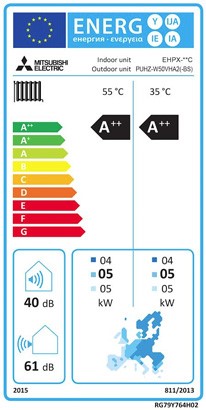What is the ErP Directive?
Manufacturers of energy-using products, such as heat pumps, are now required to meet minimum performance standards. The Energy Related Products Directive (ErP) has been devised by the EU in order to help consumers easily recognise energy efficient products.
Our Ecodan air source heat pump partners, Mitsubishi Electric, offer an ErP Directive overview in the video below:
How does this affect heat pumps?
Seasonal space heating energy efficiency (SSHEE) is defined in the ErP legislation as: “The ratio between the space heating demand for a designated heating season, supplied by a heater and the annual energy consumption required to meet this demand, expressed in %.”
This means that the ErP rating is more accurate than the previously used Coefficient Of Performance (COP) which only offered an indication of efficiency at a single point in time (with a high outside air temperature); leading to potentially exaggerated efficiency ratings.
The improved ErP rating incorporates temperatures for “designated heating seasons”, and will subsequently produce more realistic energy ratings for your system.
Additionally, the directive will now apply to all heating and hot water products such as gas or electric heating, providing you with an easy way to directly compare the efficiencies of different systems.
What does the new labeling system look like?
A heating system is labelled similarly to the energy rating on a property with G being the lowest rating and A++ being the highest, with more energy ratings expected to be added in the future.
Mitsubishi Ecodan air source heat pumps have been awarded the highest possible energy rating of A++.

How does the ErP Directive affect the RHI?
ErP labeling will be a requirement of the new MCS Installation Standard which was published on 6 May 2015, but until 25 March 2016 the older version will also remain in force.
Applicants will continue to have one year from the date that their system was commissioned to apply for the Domestic RHI. The ErP labeling came into force on 26 September 2015 and applies to all heat pump manufacturers. Although, for the following six months installers will be able to install heat pumps that entered the market prior to 26 September 2015 using either the new or old MCS Installation Standard for the purposes of the RHI.
This period ends on 25 March 2016 and after this date all MCS certified heat pumps must be installed using the latest Installation Standard for heat pumps. If your heat pump is installed after the 25th of March 2016, and it is not compliant with the new MCS Installation Standards you will not be able to qualify for the Renewable Heat Incentive.
Visit ofgem.gov.uk for more information »
Ensure your heat pump is compliant
From 26 March 2016, consumers installing a heat pump who wish to claim from the RHI should ensure their chosen heat pump is ErP compliant. This will be demonstrated by the provision of a valid product label. Domestic consumers will continue to have 12 months from the commissioning date of a heating system to apply for the RHI.
Any heat pumps that have entered the market before 26 September 2015 have until 25 March 2016 to provide additional test data that demonstrates ErP compliance in order to maintain MCS certification.
Consumers should be aware that a heat pump that has not demonstrated ErP compliance by 25 March will not be eligible for the RHI if it is commissioned after this date. Domestic consumers should check the Ofgem Product Eligibility List for more details on heat pump eligibility and ask their Source Energy Account Executive for further details.